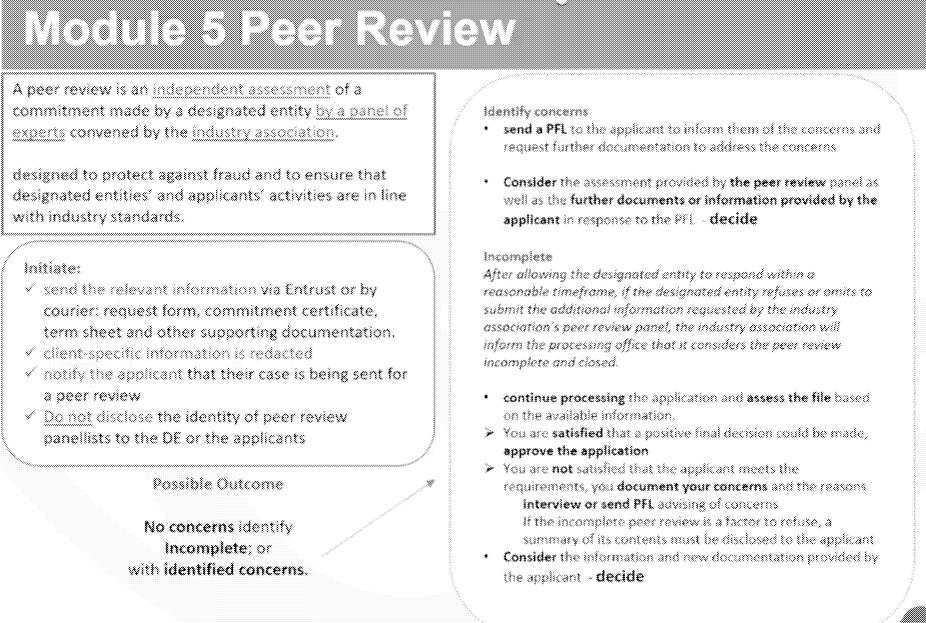Exploring how IRCC officers will operate starting August 1, 2024, following the suspension of the Peer Review process for the Start-up Visa (SUV) program. This change transfers the full responsibility for evaluating applications onto IRCC officers, a shift that will undoubtedly have wide-ranging implications for Canada's business immigration landscape.
What Was the Peer Review Process?
Before the suspension, the Peer Review process played a crucial role in ensuring the integrity of the Start-up Visa program. When concerns arose regarding the accuracy of the information provided — such as whether a business plan was realistic or if a proposed innovation was truly novel — external experts were called in to provide an independent assessment. These reviewers helped prevent fraud and ensure that only credible and innovative businesses were selected for the SUV program.
IRCC officers followed a structured process to initiate a Peer Review for Start-Up Visa applications. This process began when an officer believed that an independent assessment could assist in evaluating the application or as part of a quality assurance exercise. Officers would send key documents, like the commitment certificate and term sheet, to the industry association. Before submission, they made sure to redact sensitive information, such as the applicant's birth date and address. The officer then informed the applicant about the Peer Review but kept the identity of the panel members confidential.

The expert panel, made up of seasoned entrepreneurs, industry specialists, and even members of designated organizations — excluding those that provided the letter of support for the applicant in question — reviewed the submitted documentation to ensure its completeness and adherence to industry standards. Following the review, officers considered the panel’s assessment alongside any additional information provided by the applicant before making a final decision.
What Has Changed?
With the suspension of Peer Review, uncertainty arises over how IRCC officers will handle their expanded role in evaluating applications. Without expert involvement, it’s questionable how effectively officers, given their current level of training, can assess businesses. They lack the specialized expertise and in-depth knowledge in fields like blockchain, software, cloud computing, AI etc. Will they now receive extra training to cover the areas where the Peer Review panel once provided guidance? What we do know is that decisions will now depend entirely on each officer's judgment.
However, some officers have shown they can be very thorough. For instance, in one of our client’s cases, an officer went beyond the usual steps, investigating the startup’s online presence and even signing up for its services to understand the business from the inside. This level of detail is encouraging, but it won’t always be the case. Without expert reviewers, one officer might dig deep into an application, while another might simply refuse it if they have doubts, potentially leading to inconsistency across decisions.
Potential Benefits of the Decision
Faster Processing Times
One of the key advantages of this decision is the potential for faster processing times. Without having to wait for external experts to evaluate applications, IRCC can make decisions more efficiently, reducing the wait time for applicants. This could be particularly beneficial for entrepreneurs who need to launch their businesses in Canada quickly.
Reduced Administrative Complexity
By centralizing the evaluation process within IRCC, the need to coordinate with the commission is eliminated. This change allows IRCC to focus directly on processing applications, which could make the overall system run more efficiently.
Consistency in Decision-Making
Centralizing the review process within IRCC has the potential to lead to more consistent decision-making, but this will only be possible if IRCC develops a training guide for its officers. Such a guide would ensure that every officer follows the same procedure when evaluating applications, minimizing the variability that sometimes occurred when different external experts were involved. If all officers apply the same standards and processes, this could help guarantee that applications are assessed according to uniform criteria. Without this standardized approach, decisions could still vary depending on the individual officer’s judgment.

Drawbacks and Risks
Lack of Specialized Expertise
While the new process may bring greater efficiency, it also raises concerns about the loss of expertise. Peer reviewers brought specialized knowledge in specific industries, enabling them to thoroughly assess innovative and complex startup ideas. With the suspension of Peer Review, IRCC officers may lack the industry-specific insights needed to fully understand certain startups. The question of how officers will be trained moving forward remains open, and without expert input, the risk of incorrect rejections due to misunderstandings could rise.
Potential for More Litigation
Another risk is the potential increase in legal disputes. Entrepreneurs who believe their applications were not properly evaluated may be more likely to pursue legal action. From 2022 to 2024, there were 39 legal cases related to the Start-up Visa program. With the suspension of Peer Review, this number is expected to grow as applicants may feel that decisions made by IRCC officers lack the same level of expertise that the commission has previously provided.
Future Considerations
The long-term impact of suspending Peer Review remains uncertain. While the change could lead to faster processing times and more consistent evaluations, concerns about the loss of expert insights and the adequacy of future officer training persist. As the SUV program continues to evolve, it will be important to monitor how these changes affect both the quality of approved startups and the number of rejected applications that lead to litigation.
For now, stakeholders should remain informed about ongoing developments in the Start-up Visa program. As we see how IRCC adapts to these changes, the potential benefits and drawbacks will become clearer.
Stay connected with us for updates on how this shift may impact future applications and outcomes under the Start-up Visa program.
